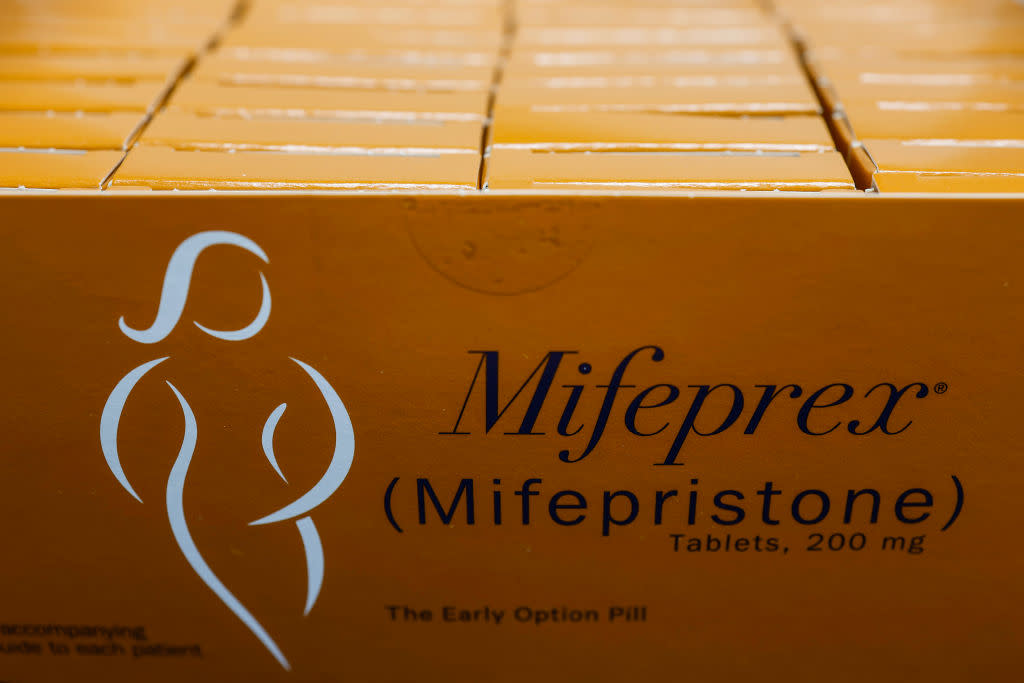Out-of-state abortion pill providers must stop advertising and sales in Arkansas, AG orders

- Oops!Something went wrong.Please try again later.
(Photo illustration by Anna Moneymaker/Getty Images)
Arkansas Attorney General Tim Griffin sent cease and desist letters Tuesday to two companies, one in New York and one in the Netherlands, that have advertised their ability to provide abortion medication to Arkansans.
Abortion is illegal in Arkansas with a narrow exception to save a pregnant person’s life. The 2019 “trigger” law went into effect in June 2022 upon the U.S. Supreme Court’s decision to overturn Roe v. Wade.
Griffin said in a Tuesday news release that this law makes it illegal for companies outside Arkansas to sell and ship abortion medication to residents.
2024-05-21-Aid-Access-Cease-and-Desist-Letter
“These companies must cease and desist advertising relating to the performance of abortion services in Arkansas immediately or face the possibility of lawsuits from my office,” Griffin said.
New York City-based Choices Women’s Medical Center has a page on its website stating that it serves clients from Little Rock. New York state allows abortions up to 24 weeks of pregnancy.
Aid Access, started in 2018 by Dutch physician Dr. Rebecca Gomperts, is an online-only medication abortion provider that aims to serve people in countries such as the U.S. where abortion access is limited or banned.
The general counsel of the anti-abortion National Right to Life Committee told NBC News in 2022 that federal action would be necessary to stop Aid Access and other groups from selling abortion pills in states with abortion restrictions because “state laws have limited extraterritorial effects.”
However, Griffin’s letters to each entity state that his office would sue them under the Arkansas Deceptive Trade Practices Act if they continue to advertise and sell their products in the state. Those found liable for violating the ADTPA can be fined up to $10,000 per violation.
The cease and desist letters “clearly state the statutory basis for our warning to these companies,” said Jeff LeMaster, a spokesman for Griffin’s office.
Both companies have 14 days to contact Griffin’s office in writing with “the steps [they] have taken to remedy this situation,” according to the letters.
Medication abortion involves taking mifepristone first followed by misoprostol. The two-drug regimen accounted for about 63% of abortions within the United States in 2023 — a 10% increase since 2020 — according to a report from the Guttmacher Institute.
In April 2023, a federal judge in Texas issued a ruling ordering mifepristone to be pulled from the market and its federal Food and Drug Administration approval reversed. A federal appeals court ruled in August that the drug could remain available for the foreseeable future.
The Supreme Court heard arguments in the case in March, with justices indicating skepticism toward the arguments of the anti-abortion organizations who are plaintiffs in the case.
Here in Arkansas, Rep. Wayne Long, R-Bradford, introduced two bills meant to restrict medication-induced abortion during the 2023 legislative session. One would have banned chemical abortions and the other would have increased the criminal penalties for violating state law regarding abortion-inducing drugs.
Neither bill was heard in committee, but Act 702 of 2023 allows revocation of physicians’ medical licenses if they are found to have violated Arkansas’ abortion-inducing drugs law.
Supporters of abortion access have until July 5 to collect signatures for a proposed ballot measure, with language approved by Griffin, that would create a constitutional right to abortion “within 18 weeks of fertilization” and include exceptions for rape, incest, a fatal fetal anomaly or to “protect the pregnant female’s life or physical health.”
Griffin’s move to end the marketing and sale of abortion pills in Arkansas “makes it even more critical that the Arkansas Abortion Amendment is on the ballot in November,” Arkansans for Limited Government, a ballot question committee advocating for the passage of the amendment, said in a statement Tuesday.
“The state government is working every angle at its disposal to ensure that Arkansas women in need of abortion care have no options for accessing it, which, as research shows, puts their lives at risk,” the committee wrote. “Arkansans who believe that the government should not have the power to interfere in their healthcare decision-making need to work the angles at our disposal to fight back. That means leveraging the most effective tool we have: direct democracy.”
GET THE MORNING HEADLINES DELIVERED TO YOUR INBOX
The post Out-of-state abortion pill providers must stop advertising and sales in Arkansas, AG orders appeared first on Arkansas Advocate.

